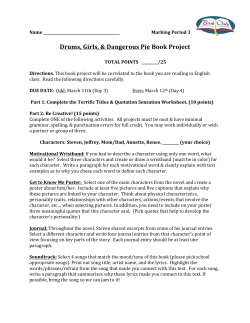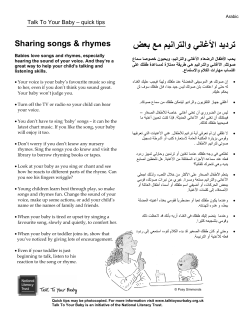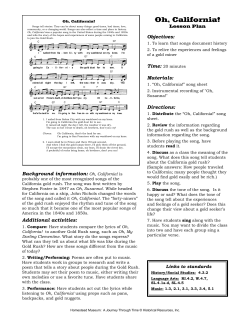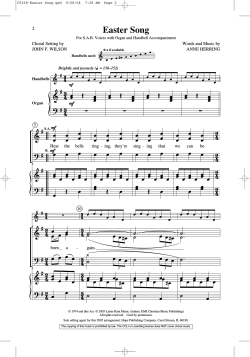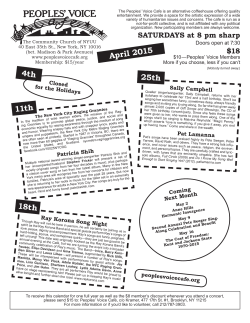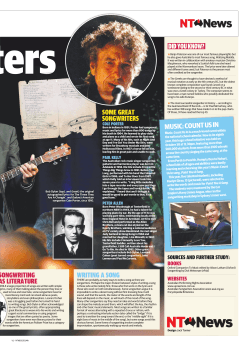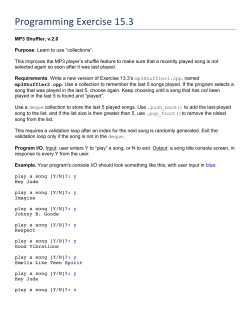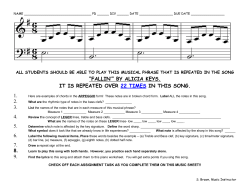
The Speech and Language Benefits of Music & Song!
The Speech and Language Benefits of Music & Song!
By Janice Mervyn M.H.Sc. B.Ed. Reg. CASLPO, Speech Language Pathologist
First Words Preschool Speech and Language Program of Ottawa
Parents worldwide instinctively know that singing often soothes a fussy baby. Before a baby can say what they want,
their behaviour reinforces how we interact with them. If a baby calms or giggles when we sing to them this encourages
us to sing more. This early reciprocal relationship sets the foundation for early communication and later conversation!
See the little bunnies sleep,
on the ground so quietly......
.....wake up little bunnies and HOP HOP HOP .....
My children loved this “sleeping bunnies” song. It is not surprising as it is a song full of repetition, pretend, exaggerated
rhythm, anticipation and movement...all great stuff! Let’s consider what else is going on while our children giggle and
respond to their favourite songs...
Music has many inherent benefits for language development. Through exposure to music, children develop their
attention and listening skills and they benefit from more specific aspects such as rhythm, repetition and movement.
Rhythm, Rate & Rhyme
the itsy bitsy spider.....
Children listen intently to the rhythms and inflections of songs which helps them develop their listening skills.
Anticipating the rhythm and pace of a song and hearing rhymes helps children learn how language flows and builds their
vocabulary skills. Eventually they can make their own rhymes and then segment words into parts which is one of the
most important prereading readiness skills.
Repetition
twinkle twinkle little star...
row row row your boat...
The repetitive nature of early songs helps children learn words, specific sounds and basic parts of speech. Putting
words to music breaks them down into syllables, emphasizes key consonants and slows down the sounds of speech.
Repeated exposure helps children make sense of how the rules of language operate and builds predictability. This is
evident when you pause during a song and your child fills in the next word.
Movement
the wheels on the bus go round and round....
head and shoulders, knees and toes....
Babies and young children seem to learn best when songs are experienced through their bodies. Movement paired with
music greatly enhances the acquisition of language. Children who see others hopping all around the room will engage
and associate the words with the actions they are experiencing. This helps build their receptive vocabularies and it
makes the language real.
Multisensory benefits
When children sing and dance they are using: their voices to produce language, rhythm, and pitch; their ears to listen to
the voices and sounds around them; their eyes to follow the movements of others; and their whole bodies to develop
rhythm and coordination.
Research about the brain shows that music and singing stimulates new learning and helps in memory processes.
Recent brain research tells us that when children sing and move to music, their developing brains are fully engaged as
both the left and right sides of the brain are activated.
Sing, sing a song...
The first three years of a child's life are the most critical in the development of communication skills. It is never too soon
to expose your child to music and song. It doesn’t matter if you have perfect pitch, only your enthusiasm is required.
Simple songs with easy movements are best for the baby-to-preschool crowd such as: "Row, Row, Row Your Boat" and
the "Itsy Bitsy Spider."
Add your own words to familiar songs. You can personalize the tune of "If You're Happy and You Know It" by adding the
name of a family member to each verse ("If you’re Benny and you know it clap your hands"). Linking familiar songs to
new information can help children with learning.
Speech and language develop best in a world that is rich with sounds, sights, and consistent exposure to speech and
language. Music and song provide a wonderful way to stimulate a child’s communication development. Whether you
are caring for an infant or a school age child.... interacting through song is a great way to have fun and communicate
together.
Remember - early intervention is the best approach!
Visit a First Words screening clinic if you have questions or concerns about your child’s
communication development. For more information,
visit our website at www.firstwords.ca or call Ottawa Public Health Information at (613) 580-6744.
© Copyright 2025

